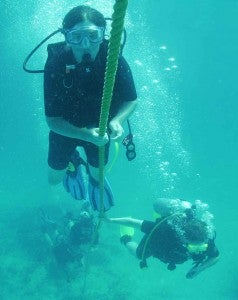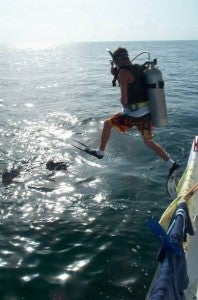
Shawn Simonson’s syllabus for Kinesiology 580 Special Topics opens with “You are floating at 100 feet. Relaxed, breathing easy through your regulator, your buoyancy is perfect …” Simonson continues describing a tropical scuba dive experience, including the body’s reaction upon ascending back to the surface. He asks students if they can “explain how the body responds to the increased pressure of the undersea world?” and promises answers throughout his new course on Hyperbaric Physiology.
Simonson, associate professor in the School of Kinesiology, will lead a group of ten graduate students this fall on an adventure of a lifetime. The students will study how the human body adapts and performs in the hyperbaric, or increased pressure, of the underwater world. During the course, the students will earn their PADI Open Water scuba certification and will practice what they learn during a field experience in December, after the end of the term, when they travel to the Exuma Islands in the Bahamas for a week on a live-aboard dive boat.
In addition to learning about the physiological changes that occur while diving, the students will learn about the physics of underwater environments, the oceanic flora and fauna adaptations to the pressure in the sea, and the unique ecosystem that exists in the sea, including how lifestyles above water may impact the oceans.

Once students have successfully earned their scuba certification and completed the classroom portion of the course, the students will travel to Nassau, Bahamas on Dec. 26 to begin their field experience. They will live on board a 65 foot sailboat that is owned and operated by Blackbeard Cruises, a company that specializes in educational diving and snorkeling cruises and the live-aboard experience. While on board, they will serve as part of the crew, completing necessary chores, such as wheel watches, mooring the boat to dive sites, washing dishes and cleaning cabins. They will also dive, sail, swim, snorkel, fish and, when on land, they will visit the Shark Lab in Bimini and explore nature trails and historic landmarks on the various islands. The students will also complete 20 hours of service, such as beach cleaning, underwater clean-ups, fish identification and counting, invasive species management and mooring repair.
The course is open to six more students. Learn more about the Bahamas at https://www.boisestate.edu/globaleducation-glo/. If you are interested in enrolling in the course, contact Simonson at 208-426-3973 or shawnsimonson@boisestate.edu.
A fund has been established within the Boise State University Foundation to help defray the costs associated with this once-in-a-lifetime experience. To find out how you can support the students in this endeavor, contact Jon Larkin, director of development for the College of Health Sciences at 208-426-2124 or jonlarkin@boisestate.edu.